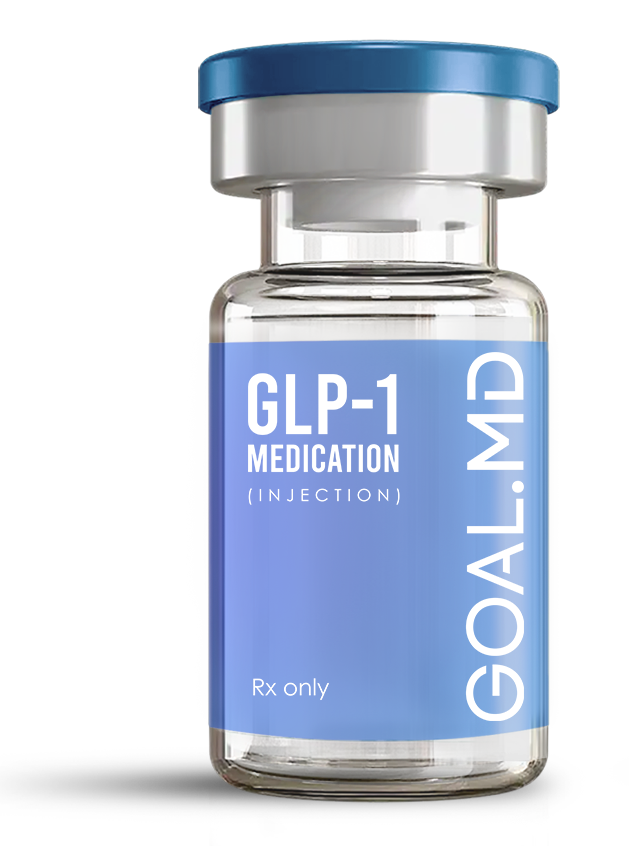
GOAL.MD Health & Wellness Blog
Evidence-based insights, medical weight loss information, and practical tips from our physicians and healthcare experts.

How to Tell the Difference Between Emotional Hunger and Real Hunger on GLP-1s
Why Hunger Feels Different on GLP-1s
GLP-1 medications like semaglutide and tirzepatide slow digestion, regulate blood sugar, and reduce appetite. Many patients expect hunger to disappear entirely—but cravings, especially emotional ones, can still sneak in.
The key is learning to recognize the difference between physical hunger (your body’s need for energy) and emotional hunger (driven by stress, boredom, or feelings). Patients at Goal.md often find that once they understand this distinction, staying consistent with treatment becomes much easier.

Signs of Physical Hunger
Real, physical hunger usually:
Builds gradually over time
Is satisfied by many different foods (not just one specific craving)
Comes with body cues like stomach growling, low energy, or lightheadedness
Improves once you eat an appropriate meal or snack
👉 At Goal.md, patients are encouraged to track physical hunger cues daily as part of their progress logs.
Signs of Emotional Hunger
Emotional hunger often feels very different:
Comes on suddenly, not gradually
Craves specific comfort foods (often sugary or salty)
Isn’t satisfied even after eating
It is tied to mood—stress, anxiety, or boredom may be the trigger
✅ Hack: Next time you feel “hungry,” pause and ask, “Did this come on suddenly, or has it been building?” The answer often reveals whether it’s emotional or physical.
Why Emotional Hunger Still Happens on GLP-1s
Even with reduced appetite, emotional eating habits can linger. Food has been a comfort or stress-reliever for many people long before treatment. GLP-1s don’t erase those patterns—they simply make them easier to recognize.
That’s why providers at Goal.md remind patients to work on both the physical and emotional sides of eating.
Strategies to Manage Emotional Hunger
1. Practice the Pause
Before eating, take a few deep breaths and check if your body is truly hungry.
👉 Many Goal.md patients journal these “pause moments” to spot emotional triggers.
2. Find Non-Food Coping Tools
Stress walk, stretch, read, or call a friend—any activity that helps without reaching for food.
3. Balance Meals with Protein & Fiber
Stable blood sugar reduces false hunger signals. Pairing GLP-1 therapy with balanced meals keeps cravings lower.
4. Stay Hydrated
Mild dehydration can disguise itself as hunger, especially when cravings are sudden.
When to Reach Out for Support
If emotional hunger feels constant or hard to manage, it may be time to check in with your provider. A supportive care team can help you create strategies tailored to your lifestyle.
That’s why Goal.MD patients have access to coaching and accountability, not just prescriptions. It’s about treating the whole journey—not just the appetite.
Final Thoughts
Learning the difference between emotional and physical hunger on GLP-1s is empowering. When you can pause, identify what your body actually needs, and choose intentionally, you take control of the journey instead of letting old habits lead the way.
It’s not about perfection—it’s about awareness. And with support, you can build healthier patterns that last long after the cravings fade.
👉 Click here to get started with Goal.md
Why GOAL.MD?
✅ Sourced from audited 503a US compounding pharmacies.
✅ Custom dosages adjusted to your needs.
✅ Free consultation + 24/7 support.

How It Works
1. Quiz
90 seconds. No commitment.
2. Consult
Video chat with your GOAL.MD doctor.
3. Deliver
Meds at your door tomorrow.
Transform Your Life with Physician-Directed Care
Join thousands who've found success with physician-directed care. Take our 3-minute quiz to see if medical weight loss is right for you.







